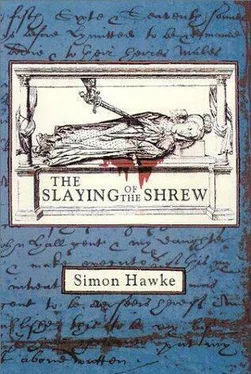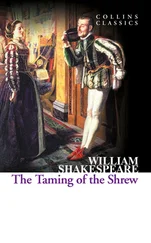Simon Hawke - The Slaying Of The Shrew
Здесь есть возможность читать онлайн «Simon Hawke - The Slaying Of The Shrew» весь текст электронной книги совершенно бесплатно (целиком полную версию без сокращений). В некоторых случаях можно слушать аудио, скачать через торрент в формате fb2 и присутствует краткое содержание. Жанр: Исторический детектив, на английском языке. Описание произведения, (предисловие) а так же отзывы посетителей доступны на портале библиотеки ЛибКат.
- Название:The Slaying Of The Shrew
- Автор:
- Жанр:
- Год:неизвестен
- ISBN:нет данных
- Рейтинг книги:5 / 5. Голосов: 1
-
Избранное:Добавить в избранное
- Отзывы:
-
Ваша оценка:
- 100
- 1
- 2
- 3
- 4
- 5
The Slaying Of The Shrew: краткое содержание, описание и аннотация
Предлагаем к чтению аннотацию, описание, краткое содержание или предисловие (зависит от того, что написал сам автор книги «The Slaying Of The Shrew»). Если вы не нашли необходимую информацию о книге — напишите в комментариях, мы постараемся отыскать её.
The Slaying Of The Shrew — читать онлайн бесплатно полную книгу (весь текст) целиком
Ниже представлен текст книги, разбитый по страницам. Система сохранения места последней прочитанной страницы, позволяет с удобством читать онлайн бесплатно книгу «The Slaying Of The Shrew», без необходимости каждый раз заново искать на чём Вы остановились. Поставьте закладку, и сможете в любой момент перейти на страницу, на которой закончили чтение.
Интервал:
Закладка:
“Wait,” said Smythe.
“Wait? I am done with waiting! ‘Tis a simple thing for you to say-”
“Be still!” Smythe said, turning around. “Someone is coming!”
Elizabeth stiffened, turned, and froze, like a startled deer, eyes wide and peering into the night. Over the faint pattering of raindrops, they heard the unmistakable sounds of voices in the distance. And a moment later, they could see the bobbing light of torches coming towards them.
“God’s body! Death and damnation to them all!” cried John, and he threw his shoulder against the door with all his might.
9
Shakespeare had grown up in the country and knew how to ride bareback, but then he had not done so since he was a boy. Nor, he quickly realized, was he even remotely nostalgic for the experience. He had always liked horses and counted himself a decent rider, but he had been spoiled by saddles. Riding bareback at the gallop, which he had done so often in his childhood, was now a punishing experience.
The coachman had not wanted to abandon the expensive carriage and had argued that they should try to get the wheel back on once more. Shakespeare had insisted that they had no time to lose and the horses had to be unhitched and ridden bareback. They had argued and Shakespeare said that he would take one of the horses and ride back no matter what, come Hell or high water. They had nearly come to blows over it, and the argument was settled finally when they noticed that the wheel had cracked and the axle had been damaged. There was nothing for it but to abandon the carriage in the road and ride the horses home.
They had quickly modified the harnesses, shortened the reins and gotten on their way, by which time their already muddy clothes were reduced to little more than torn and sodden rags, but nightfall had caught up to them and they lacked a clear sky and a full moon by which to see. The rain had let up somewhat, but the roads were still puddled and quite soft in places. With Shakespeare insisting on riding at the gallop, the going was treacherous, to say the least.
By the time they reached Middleton Manor, Shakespeare was roundly cursing every mare that ever foaled. They came splashing up the road leading to the house, skidded on the wet cobblestones of the courtyard and nearly went down in a tangle, but somehow, miraculously, their mounts managed to retain their footing and they reined in without further incident. Their noisy arrival, however, had alerted some within the house, for many of the guests had not retired early and were still participating in the wake. A few of them might even have remembered whom the wake was for.
Humphrey, the ever-efficient steward, was one of the first upon the scene as they came staggering up to the front door, looking for all the world like two weary and embattled soldiers freshly returned from the wars.
“Good God!” he said, when he beheld their grim and grimey appearance. “What happened, for mercy’s sake? Have the two of you been set upon by brigands?”
“The carriage broke down on the road from London, but never mind that now,” Shakespeare said, trying to catch his breath. “Damn me, but I need a drink! Is Sir William here?”
“Sir William had departed hours ago,” said Humphrey, as the hall behind him began to fill up with curious onlookers. “You look like Death! What is the matter?”
“Get the master of the house at once!” said Shakespeare. “And get Tuck Smythe. And get me a drink, while you are at it.”
“I shall do no such thing!” Humphrey replied, in an affronted tone. “Master Middleton has retired. This day has been a terrible trial for him, as you must surely know. He is grief-stricken and exhausted. His daughter’s funeral has been a horrible ordeal for him.”
“Well, then wake up the old bugger and we shall crack open the tomb and raise her up again! And God damn it, get me a tupping drink!”
The crowd behind Humphrey gasped collectively. But a few were enough past the point of caring that they chuckled at Shakespeare’s irreverent remarks. Humphrey tossed them an acid gaze over his shoulder, then turned the full force of his basilisk glare on Shakespeare and the hapless coachman, who simply stood there helpless, not knowing what to say or do.
“You must be drunk!” said Humphrey, with outrage. “I shall have you thrashed and driven off the property!”
“Then you shall answer to Sir William Worley,” Shakespeare replied, shoving past the incredulous steward and making his way toward the tables. “And you shall likewise answer to your master, who shall not take kindly, I assure you, to being deprived of his eldest daughter for yet a second time!” He picked up a goblet and filled it, then quaffed it in one breath.
By now, more people had gathered round and everyone was talking at once. Humphrey was sputtering with outrage and turning purple with apoplexy, but Shakespeare did not care. He refilled the goblet and drank it down again, spilling some of the wine down his already thoroughly drenched and muddy doublet. It was ruined and it had been one of only two he owned, and the second one was threadbare, whereas some of the guests around him thought nothing of wearing at least three different doublets in one afternoon. He was tired; he was sore; he was cold and he was wet. He was a poet, not some post rider, and he felt resentful of the entire company around him. He had come to stage a play, and instead had played a part in one, the part of errand boy. Worse still, the whole situation had been nothing but a sham.
“Now see here-” Humphrey began, but Shakespeare merely shoved him away roughly without even a glance at him or a break in drinking.
“What in Heaven’s name is all this row?” Godfrey Middleton’s voice cut through the conversation. He stood up in the gallery, wearing a velvet dressing gown and looking down on the assemblage with cold fury. His gaze settled on Shakespeare as the obvious center of it all. “For the love of God, sir, have you no respect? No decency? My eldest daughter has just been laid to rest!”
“Well, mark my word, Master Middleton, she shan’t be resting long,” Shakespeare replied.
“This is an outrage!” Middleton said.
“I shall have the servants throw the vile villain out at once!” Humphrey said, finding his voice at last. “I shall set the dogs upon the pestilential rascal!”
Middleton suddenly seemed to recognize Shakepeare for the first time. “You are the man Sir William sent to London, are you not?”
“I am that very man,” Shakespeare replied. “Or what is left of him after the foul journey I have made. Your carriage, by the way, lies broken on the road some miles hence, I cannot say how far or where, precisely. We had tried to fix it once, but the damned wheel came off again a few miles down the road and cracked, and there was an end to it. By now, ‘tis likely kindling for some rufflers. We unhitched the horses and rode back like red Indians in the pouring rain, your coachman and I, and we are tired men and chilled straight through to the bone, but by God, we have brought fascinating tidings! To wit, sir…” He took another long drink from the goblet, “… your daughter is not dead, because there was no poison in that flask from which she drank. ‘Twas instead a potion merely meant to lull her for a time into the arms of Morpheus and only make it seem as if she slept eternally with Hades. So go back to your bed and rest you well, sir, if you wish, but know that when you wake upon the morrow, you shall find that Catherine had awoke afore you and absconded with her lover.”
He ignored the stunned reactions of the guests around him, turned his back on Middleton, and reached across the table for a cold and greasy drumstick that looked more appetizing to him now than any dish that he had ever seen. As he bit into it, he turned back and looked up towards the gallery. Middleton was gone. Shakespeare glanced at Ian, the coachman, who was staring at him with absolute astonishment, and shrugged.
Читать дальшеИнтервал:
Закладка:
Похожие книги на «The Slaying Of The Shrew»
Представляем Вашему вниманию похожие книги на «The Slaying Of The Shrew» списком для выбора. Мы отобрали схожую по названию и смыслу литературу в надежде предоставить читателям больше вариантов отыскать новые, интересные, ещё непрочитанные произведения.
Обсуждение, отзывы о книге «The Slaying Of The Shrew» и просто собственные мнения читателей. Оставьте ваши комментарии, напишите, что Вы думаете о произведении, его смысле или главных героях. Укажите что конкретно понравилось, а что нет, и почему Вы так считаете.












